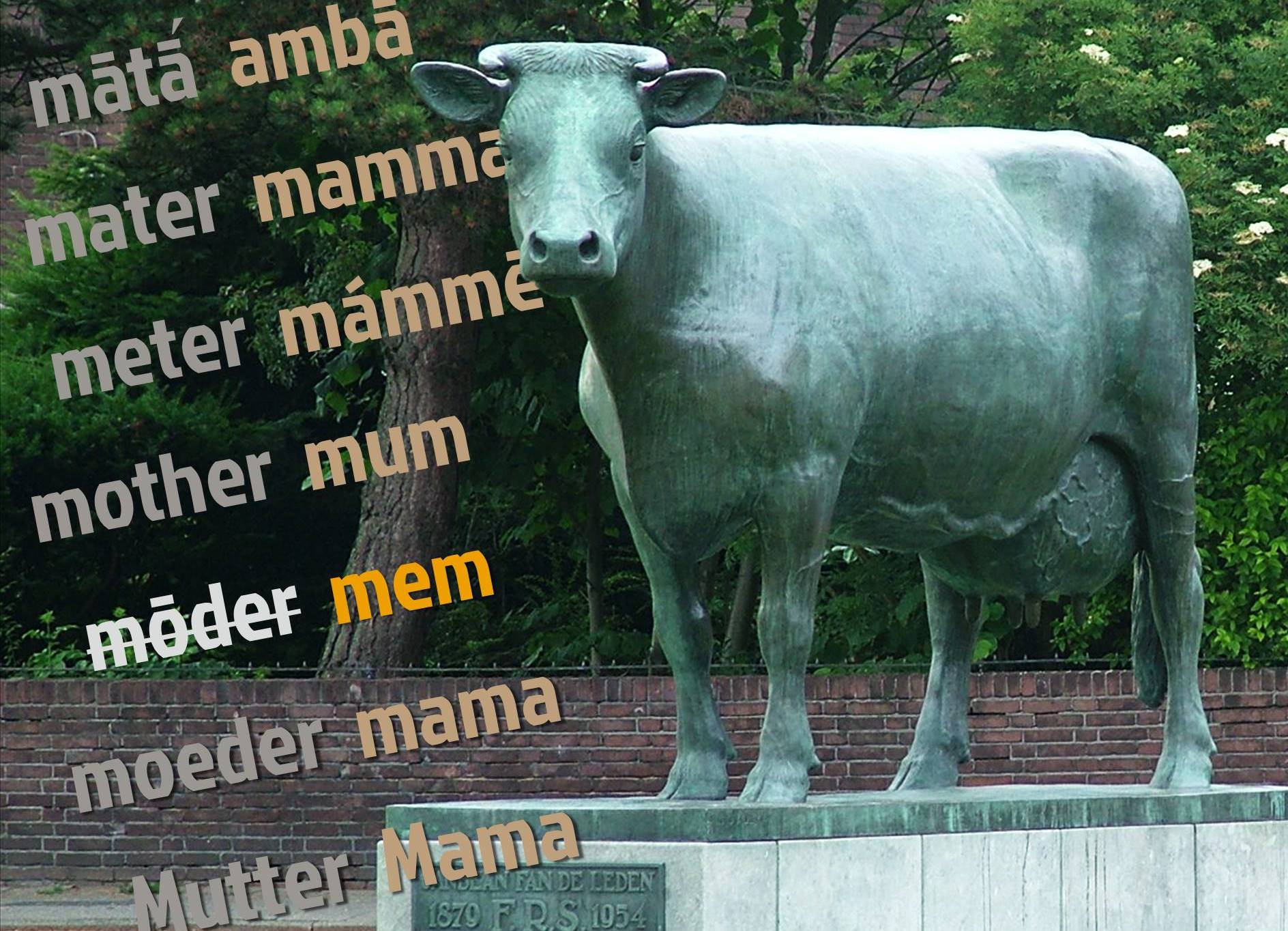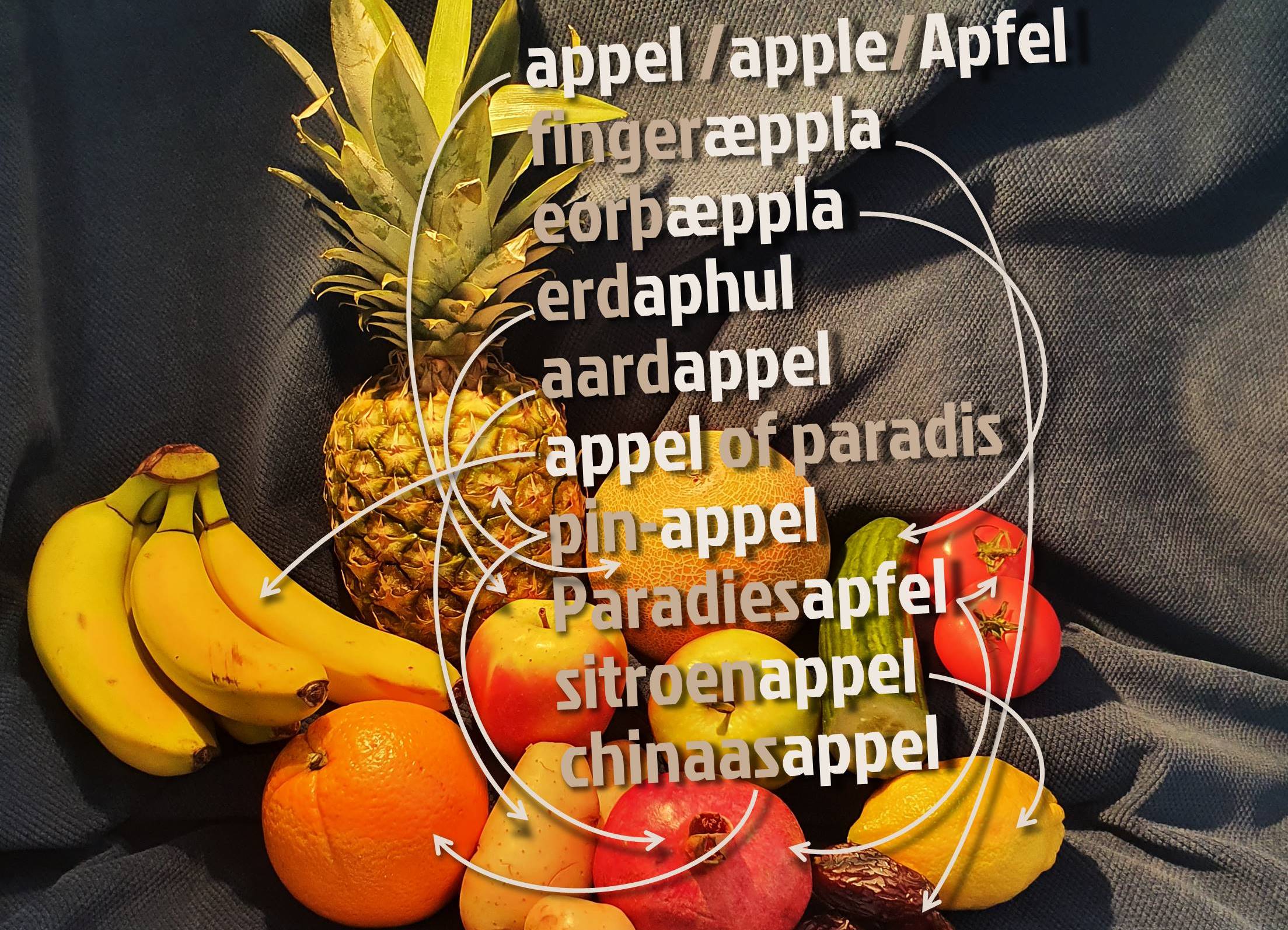WEST GERMANIC
Mem
Linguistics
| 15-06-2021
From German, Dutch and English Mutter, moeder and mother to meter, mater and mātā́ in Greek, Latin and Sanskrit: it is clearly visible that these words resemble each other. A striking exception to this list is Frisian mem. Why? And has it always been that way?

Central vocabulary
The languages we know today have come into being over many centuries. Each of those languages has very recent words, words dating back to centuries before our era, and everything in between. Many of the oldest words in the West Germanic languages have similarities with words in other Indo-European languages. According to the most common theory (the Kurgan hypothesis), the origin of the Indo-European culture and language lies in an area in the east of Ukraine, in the period of ± 4500-3500 BC. In the centuries that followed, the Indo-Germans moved to the area we now call Western Europe, where they mingled with the "dolmen builders" who already lived in that area at that time. Since then, of course, society has changed a lot, but some very mundane things have remained the same, even in what we call them. You can think of family terms such as father, mother, brother and sister, but also certain body parts, weather phenomena, heavenly bodies, plants and trees, and so on. These words are called the central vocabulary or core lexicon, and you can find them in almost all Indo-European languages.
Mother
The word mother is one of the words in that central vocabulary, meaning that the word for a woman who has one or more children can be traced back to the same original word in languages all over the world. Keep in mind that "the same word" does not necessarily mean that it was pronounced exactly the same everywhere. That is why it is often referred to as a "stem", a kind of basic form of a word. Based on all known variants of the word mother, linguists have reconstructed that those words go back to the root *méh2ter-, which – if I understand correctly – should be pronounced roughly as "megteer", probably with a sound that resembled the hard Dutch g as we know it today. In the Germanic area that sound expired and the voiceless ('only air') t in Dutch and English changed into a more voiced ('with vibrating vocal cords') d or th [ð]
From mōder to mem
In Old Saxon 'people wrote' mōdar, in Old High German muoter, in Old Dutch muoder, in Old English mōdor and in Old Frisian mōder. So until then – roughly before 1550 – Frisian did not deviate from the central vocabulary as far as the word for mother is concerned. In fact, the EWN also mentions two New Frisian variants, which means they're from after 1550: moer and moar. Sometime between 1550 and now that word died out in Frisian, in favour of the word mem. The Wurdboek fan de Fryske taal (Dictionary of the Frisian language) dates the word to 1802, but also mentions moer (pronunciation [mu.ər]), also from 1802, and moar (pronunciation [mo.ər]), which is dated to 1854. The words mem and moer/moar therefore co-existed for a while. About the origin of the word, the lemma 'mem' states: "Etymology: Dutch mem(me), mam(me), moeder, English mum." When I look up mama in the EWN, it says what I expected: it's a childish gibberish, whether or not adopted or influenced by French maman. For that matter, in many Indo-European languages you will come across variants of that children's word.
Mothers and women's breasts
The English form mum (1823) is a shortened form of mummy, dating from about 1839. Like mama, mommy, momma, and mom, they are derivatives of mamma, dated about 1570. The Online Etymology Dictionary mentions it as a word of which the sounds are probably a natural sound in baby-talk, perhaps imitative of sound made by babies while sucking. Around 1240, the word mamme was used in Middle Dutch to denote a woman's breast, derived from Latin mamma with the same meaning. In an article from 1905, the Woordenboek der Nederlandse taal (Dictionary of the Dutch Language) mentions mam, mem and memme as, among other things, a children's word for mother and as "a word for each of the breasts of a nursing woman". In the Van Dale Middelgroot woordenboek Nederlands (Medium Dutch dictionary) of 2015, after mam only "mama ≈ moeder" is mentioned, while at mem it only mentions the meaning "woman's breast", as an informal word. In Frisian, on the other hand, "mother" is the main meaning of mem.
In contrast to most other languages, in which informal forms such as mama and mum coexist with more formal forms such as moeder and mother, the more informal and therefore more personal variant mem has become the only common variant in Frisian. I think this informal approach fits in with the Frisian culture, and it may also have to do with the usual Frisian form of address: not Wolle jo efkes helpe? ("Would you like to help?"), but Wol mem efkes helpe? ("Would mum like to help?"). As a result, mem instinctively almost becomes a name, rather than a concept, to which a more informal form of the word fits well. But the latter is all my own interpretation.

MEM AND HEIT
What I write in this piece about the word mem, also applies to a large extent to its male counterpart heit. That's why I made two versions of this article. Because both words have different origins and history, there are of course also quite some differences to be discovered when you read both variants. You can find the version about heit here.
The languages we know today have come into being over many centuries. Each of those languages has very recent words, words dating back to centuries before our era, and everything in between. Many of the oldest words in the West Germanic languages have similarities with words in other Indo-European languages. According to the most common theory (the Kurgan hypothesis), the origin of the Indo-European culture and language lies in an area in the east of Ukraine, in the period of ± 4500-3500 BC. In the centuries that followed, the Indo-Germans moved to the area we now call Western Europe, where they mingled with the "dolmen builders" who already lived in that area at that time. Since then, of course, society has changed a lot, but some very mundane things have remained the same, even in what we call them. You can think of family terms such as father, mother, brother and sister, but also certain body parts, weather phenomena, heavenly bodies, plants and trees, and so on. These words are called the central vocabulary or core lexicon, and you can find them in almost all Indo-European languages.
Mother
The word mother is one of the words in that central vocabulary, meaning that the word for a woman who has one or more children can be traced back to the same original word in languages all over the world. Keep in mind that "the same word" does not necessarily mean that it was pronounced exactly the same everywhere. That is why it is often referred to as a "stem", a kind of basic form of a word. Based on all known variants of the word mother, linguists have reconstructed that those words go back to the root *méh2ter-, which – if I understand correctly – should be pronounced roughly as "megteer", probably with a sound that resembled the hard Dutch g as we know it today. In the Germanic area that sound expired and the voiceless ('only air') t in Dutch and English changed into a more voiced ('with vibrating vocal cords') d or th [ð]
From mōder to mem
In Old Saxon 'people wrote' mōdar, in Old High German muoter, in Old Dutch muoder, in Old English mōdor and in Old Frisian mōder. So until then – roughly before 1550 – Frisian did not deviate from the central vocabulary as far as the word for mother is concerned. In fact, the EWN also mentions two New Frisian variants, which means they're from after 1550: moer and moar. Sometime between 1550 and now that word died out in Frisian, in favour of the word mem. The Wurdboek fan de Fryske taal (Dictionary of the Frisian language) dates the word to 1802, but also mentions moer (pronunciation [mu.ər]), also from 1802, and moar (pronunciation [mo.ər]), which is dated to 1854. The words mem and moer/moar therefore co-existed for a while. About the origin of the word, the lemma 'mem' states: "Etymology: Dutch mem(me), mam(me), moeder, English mum." When I look up mama in the EWN, it says what I expected: it's a childish gibberish, whether or not adopted or influenced by French maman. For that matter, in many Indo-European languages you will come across variants of that children's word.
Mothers and women's breasts
The English form mum (1823) is a shortened form of mummy, dating from about 1839. Like mama, mommy, momma, and mom, they are derivatives of mamma, dated about 1570. The Online Etymology Dictionary mentions it as a word of which the sounds are probably a natural sound in baby-talk, perhaps imitative of sound made by babies while sucking. Around 1240, the word mamme was used in Middle Dutch to denote a woman's breast, derived from Latin mamma with the same meaning. In an article from 1905, the Woordenboek der Nederlandse taal (Dictionary of the Dutch Language) mentions mam, mem and memme as, among other things, a children's word for mother and as "a word for each of the breasts of a nursing woman". In the Van Dale Middelgroot woordenboek Nederlands (Medium Dutch dictionary) of 2015, after mam only "mama ≈ moeder" is mentioned, while at mem it only mentions the meaning "woman's breast", as an informal word. In Frisian, on the other hand, "mother" is the main meaning of mem.
In contrast to most other languages, in which informal forms such as mama and mum coexist with more formal forms such as moeder and mother, the more informal and therefore more personal variant mem has become the only common variant in Frisian. I think this informal approach fits in with the Frisian culture, and it may also have to do with the usual Frisian form of address: not Wolle jo efkes helpe? ("Would you like to help?"), but Wol mem efkes helpe? ("Would mum like to help?"). As a result, mem instinctively almost becomes a name, rather than a concept, to which a more informal form of the word fits well. But the latter is all my own interpretation.

WEST GERMANIC
Heit

WEST GERMANIC
All apples
WEST GERMANIC
In the West Germanic section, I regularly discuss a word that strikes me. I look at the meanings and forms of the word, and especially at where the word originates from. With that I compare the four West Germanic languages Dutch, English, Frisian and German, with the occasional inevitable trip across the fictional West Germanic border.
